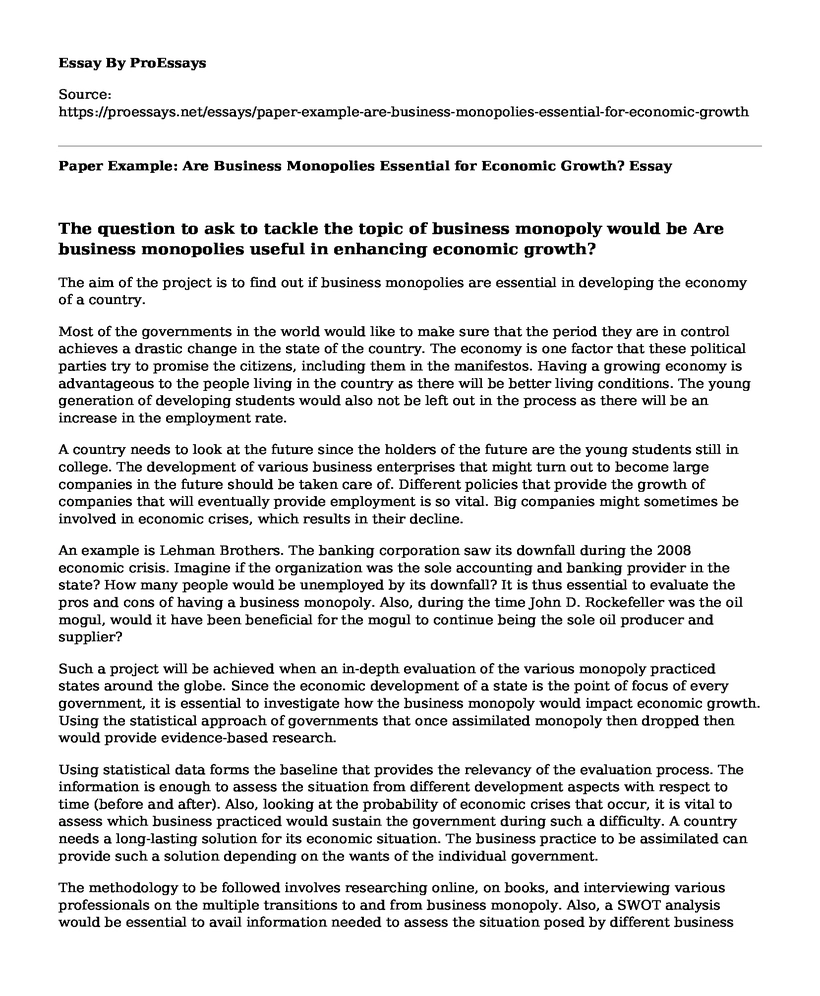The question to ask to tackle the topic of business monopoly would be Are business monopolies useful in enhancing economic growth?
The aim of the project is to find out if business monopolies are essential in developing the economy of a country.
Most of the governments in the world would like to make sure that the period they are in control achieves a drastic change in the state of the country. The economy is one factor that these political parties try to promise the citizens, including them in the manifestos. Having a growing economy is advantageous to the people living in the country as there will be better living conditions. The young generation of developing students would also not be left out in the process as there will be an increase in the employment rate.
A country needs to look at the future since the holders of the future are the young students still in college. The development of various business enterprises that might turn out to become large companies in the future should be taken care of. Different policies that provide the growth of companies that will eventually provide employment is so vital. Big companies might sometimes be involved in economic crises, which results in their decline.
An example is Lehman Brothers. The banking corporation saw its downfall during the 2008 economic crisis. Imagine if the organization was the sole accounting and banking provider in the state? How many people would be unemployed by its downfall? It is thus essential to evaluate the pros and cons of having a business monopoly. Also, during the time John D. Rockefeller was the oil mogul, would it have been beneficial for the mogul to continue being the sole oil producer and supplier?
Such a project will be achieved when an in-depth evaluation of the various monopoly practiced states around the globe. Since the economic development of a state is the point of focus of every government, it is essential to investigate how the business monopoly would impact economic growth. Using the statistical approach of governments that once assimilated monopoly then dropped then would provide evidence-based research.
Using statistical data forms the baseline that provides the relevancy of the evaluation process. The information is enough to assess the situation from different development aspects with respect to time (before and after). Also, looking at the probability of economic crises that occur, it is vital to assess which business practiced would sustain the government during such a difficulty. A country needs a long-lasting solution for its economic situation. The business practice to be assimilated can provide such a solution depending on the wants of the individual government.
The methodology to be followed involves researching online, on books, and interviewing various professionals on the multiple transitions to and from business monopoly. Also, a SWOT analysis would be essential to avail information needed to assess the situation posed by different business models.
The success of the project is entirely dependent on the findings after the assessment procedure. Expected findings involve a scenario where monopolies seem to pose more harm than good to the economic situation of a country.
Bibliography
Howitt, Dennis. Introduction to qualitative research methods in psychology. Pearson UK, 2016.
Gurel, Emet, and Merba Tat. "SWOT analysis: a theoretical review." Journal of International Social Research 10, no. 51 (2017).
OECD, J., and ECON STUD. "Lehman 10 Years Later: Lessons Learned?." Q. J. ECON 553 (2018): 557.
Erikson, Emily. Between Monopoly and Free Trade: The English East India Company, 1600-1757. Vol. 1. Princeton University Press, 2016.
Leat, Diana. Philanthropic foundations, public good and public policy. Springer, 2016.
Weimer, David L., and Aidan R. Vining. Policy analysis: Concepts and practice. Taylor & Francis, 2017.
Arnold, Scott S. "EC365-6-SP Theory of Monopoly and Regulation." (2019).
Zhang, Zhongheng. "Univariate description and bivariate statistical inference: the first step delving into data." Annals of translational medicine 4, no. 5 (2016).
Porter, Michael E., and Mark R. Kramer. "Creating shared value." In Managing sustainable business, pp. 323-346. Springer, Dordrecht, 2019.
Vogel, Steven K. Freer markets, more rules: Regulatory reform in advanced industrial countries. Cornell University Press, 2018.
Barba-Sanchez, V. and Atienza-Sahuquillo, C., 2018. Entrepreneurial intention among engineering students: The role of entrepreneurship education. European Research on Management and Business Economics, 24(1), pp.53-61.
Doppelt, Bob. Leading change toward sustainability: A change-management guide for business, government and civil society. Routledge, 2017.
Delmon, Jeffrey. Public-private partnership projects in infrastructure: an essential guide for policy makers. Cambridge university press, 2017.
Cite this page
Paper Example: Are Business Monopolies Essential for Economic Growth?. (2023, May 08). Retrieved from https://proessays.net/essays/paper-example-are-business-monopolies-essential-for-economic-growth
If you are the original author of this essay and no longer wish to have it published on the ProEssays website, please click below to request its removal:
- Research Paper Sample: Financial Crisis of 2008 Causes and Consequences Analysis
- Solutions to International Business Scenarios and Problems Essay
- Employability Skills for New Graduates - Annotated Bibliography
- Article Analysis Essay on Moral Globalization and Its Discontents
- Essay on Planning Your Future: Leverage Design Thinking, Entrepreneurship, & Innovation to Shape Your Career
- Essay Example on OSHA Compliance: Investigating Employee Complaints
- The Great Recession: 10 Years of Economic Disparity - Essay Sample







